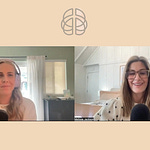Lately, I've been reflecting on the challenges I’ve had with boundaries for most of my life. Looking back now, it’s clear to me at least where part of that originates—and I'm curious if this resonates with you, too.
As neurodivergent people, from a very young age, we're given these messages that who we are authentically and the ways that we operate and desire to do things aren't quite right.

Whether someone says that outright or if it's just the subtleties and the unspoken energies in the exchange, I think this can cause us to start self-abandoning early on at an unconscious level.
As kids, it’s so important to feel accepted. This approval feels like safety, and feeling rejected, criticized, or abandoned by the outside world and possibly those we love can feel incredibly unsafe.
As a highly sensitive and intuitive person, I knew from a very young age how and who to be to stay “safe,” which meant feeling accepted and loved.
However, this outward feeling of safety can come at a cost. I relinquished my internal safety and sense of self in exchange for this external feeling of security and desire for belonging. Deep down, I believed that who I was authentically wasn't acceptable or lovable, and my gift of high sensitivity made me a natural at conforming and making others comfortable- I knew exactly who people needed me to be.
As neurodivergent kids, we can slowly begin to mask and water our true selves down in an attempt to assimilate into neuronormative culture.
We start to mask who we are and gradually conform to who others need us to be.

We become a version of ourselves that elicits a more positive response from others, a version of ourselves that gives us the love, acceptance, and, ultimately, that feeling of safety that we desire and that we possibly feared losing as children if we were authentically us.
It can become a habit to dilute who we really are and to adopt the masks and facades that get us approval.
And you know what? It makes sense. It makes sense to me that we do this, and the tendencies that this behavior leads to, like people-pleasing and perfectionism, when you think of it in this way, it’s like, well, of course, that’s going to happen.
The problem is that we know these behaviors, like people pleasing, perfectionism, and masking, often lead to inner turmoil like anxiety and struggles with mental health and low self-worth.
When I consider this, it makes perfect sense why I’ve struggled with boundaries if, from a young age, I was self-abandoning to please others in exchange for safety.

For as long as I can remember, I have not respected my internal boundaries around who I was, what I needed, and what served me. Self-abandonment became a habit as natural as breathing.
And that translated to porous boundaries where I didn't have my own back. I wasn't feeling into what I needed or who I was because, at some point, I lost who that even was.
Over the last several years, I've examined this element of myself and how it has contributed to my life in unhealthy ways. I've also been learning how to support myself now, finally having my own back and showing up for myself for the first time as an adult. It’s been a process of unlearning.
The tendency is to start with boundaries with others, but how about our relationships with ourselves?

We can have strong and healthy boundaries with others in our lives, but what happens at the end of the day if we're still self-abandoning and disassociated from our true selves and what our bodies desire and need?
So, I've noticed it's just been coming up in little ways for me. And I'm curious—I'd love to hear if you guys feel like this has impacted you in any way.
The biggest for me is self-talk. I've been starting to become very conscious of the inner voice in my head that, to be honest, was subconscious for a very long time. I didn’t realize how critical and judgmental I was of myself until more recently.
And that's been a pivotal mindset shift: becoming the observer of my own thoughts.

So as that process has evolved for me, I've started to notice I have this choice, right?
When I consciously observe my thoughts and that harsh self-critic pops up, I'm aware of this choice I have.
I need to ask myself if I want to continue thinking those thoughts or stop the thought process and choose a different one. I try to get curious about the thought, question it, and sometimes even pause to console that part of me that’s hurting or confused and return my mind to what is real and true.
I'm starting to see this as an internal boundary with myself. I can keep going down the negative self-talk path, and I know where it leads, or I can pause, check in with that part of me, choose a different thought, and be a kinder and gentler voice in my head.
And I can choose to be that loving parent to my inner child, to the wounded parts of myself that are still holding all of that shame and insecurity and self-doubt.
I can see myself still challenged with this in certain ways, and I’m trying to be softer with myself, even when I'm struggling, and giving myself grace with the process. That’s why it’s been on my heart and mind so much lately.
I wanted to share that, and I'm curious if any of you relate to this or want to share some internal boundaries that you can see in your life that you've been struggling with. Digging deeply into the root causes of these feelings and challenges with boundaries is so interesting to me. As neurodivergent people, I think it makes so much sense why this might be hard for us.
I'd love to hear from you. And if you are struggling with this, you are definitely not alone.











